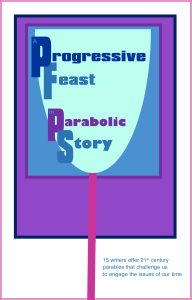OVERLOAD OF INFORMATION
When you consider the many issues and concerns that confront us as a nation and personally, one can despair at the ideological divisiveness of much of the discussion that takes place. The internet facilitates people finding all the information that bolsters whatever side of the argument they have chosen. The problem is that many people are cowed by the many arguments but find very little opportunity to explore the issue itself.
FICTIONAL THERAPY
I want to propose short fiction as a method of helping people explore issues that confuse them. The Presbyterian Writers Guild, www.presbyterianwritersguild.org, has just published a collection of 15 stories from authors living in 13 different states. You can find A Progressive Feast in Parabolic Story http://amzn.to/2sKOqNm and see how these authors used fiction as a way to explore difficult issues.
You can also use your own fiction to explore deep subjects.
FIRST STEPS
Choose any topic that interests you, be it personal relationships, the church, ministry, ethics, or some other concern in our society. Narrow that issue to how it affects the life of two or three fictional people. For example, the issue might be gun control, and your story might involve a family in conflict over whether their son should take a gun with him to college.
Provide fictional names for your main characters and have them interact over the issue. Try to make your chief characters complex enough to have mixed feelings even as they interact. Don’t have your protagonist act perfectly or the opposition be a cardboard picture of dumbness or evil. Show the complexity of real people wrestling with the issue.
CHOOSE AN INCIDENT
Choose an incident as a focus for your story that forces the characters to take some action—not necessarily good action—and then play out the consequences. Be sure to include the feelings generated as actions take place. The resolution of the story may be either positive or negative. Try to write the story in one sitting, maybe in less than an hour. The pressure to write quickly will remove the filters and give you the freedom to dig deeper.
HELP SELF AND OTHERS
What you are doing is putting words on the chaos of life and discovering how different behavior and decisions may have surprising outcomes. It is good therapy both for the author and the reader. You might even want to share your story with others and explore the issue together.

Terrific advice — and tonic for personal meditation short of writing fiction, too: “Try to make your [reflections on your interpersonal relationships] complex enough to have mixed feelings [especially in the way you remember how you and others] interact. Don’t [that you] act perfectly or the[y will be reduced to] a cardboard picture of dumbness or evil.”
Thank you!